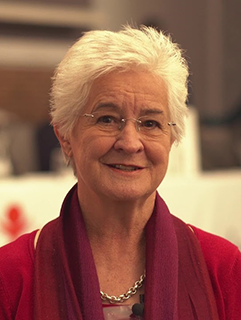Open Distance and eLearning Conference
Jennifer Glennie

Jennifer Glennie
Founding Director, South African Institute for Distance Education (SAIDE), South Africa
Jennifer Glennie, usually known as Jenny, is the founding Director of the South African Institute for Distance Education (SAIDE), an independent non-profit organization based in South Africa, but working across sub-Saharan Africa. She has committed most of her working life to investigating and promoting distance education, and, more recently, technology and open education resources (OER), to create meaningful educational opportunities for poor and marginalised groups.
Before the formation of SAIDE, in Apartheid South Africa, this campaign was driven against difficult odds and in the face of an extremely hostile government. For fifteen years and in various senior capacities in SACHED (the SA Council for Distance Education), Glennie played a leading role in large projects emphasising contextually appropriate, activity-based learning materials and a wide range of student support mechanisms (unheard of in South African distance education at the time). These included teacher upgrading projects, a ground-breaking 24-page educational newspaper supplement covering formal and non-formal courses aimed at black adults and out-of-school youth, a university access programme for poorly prepared students, and a programme for the training of labour and community organizers.
Soon after SAIDE’s establishment, in 1994, Glennie spearheaded an international review that assessed current distance education provision and painted a vision of the contribution that distance education could make to the transformation of South Africa’s education system. Building on this, Glennie played a leading role in shaping what is considered to be quality distance education in South Africa through the development set of guidelines, published by NADEOSA – South Africa’s distance education association, of which she was a key mobiliser and the founding President ‒ and SAIDE’s Good Practice Guide for Distance Education in a Digital Age, developed for the Council on Higher Education. Through a number of contributions by SAIDE to government, she helped shape and inform South Africa’s distance education policy across the post-schooling sector in the direction of an open learning perspective. She has consistently placed emphasis on the importance of student success as a complement to the usual emphasis on student access.
She brought this passionate commitment to the governance positions to which she was appointed: South Africa’s representative on the Commonwealth of Learning (COL) for two terms, and the Broad Transformation Forum and the Council of UNISA (South Africa’s massive distance education university) for over 20 years.
After serving on the organizing committee for the Second Pan-Commonwealth Conference in Durban in 2002 and as joint chair of the organizing committee for the All-African Ministers’ Conference in Cape Town in 2004, Glennie became increasingly involved in sub-Saharan Africa through the African Council on Distance Education (which recently officially recognised SAIDE’s contribution), and a number of initiatives supporting African universities and teacher training colleges.
The emergence of open educational resources (OER) was an important development for Glennie, with SAIDE embracing the concept at an early stage as further ammunition in its quest to extend access to quality education. Among other initiatives, which SAIDE embarked on, to enhance the development of policy and practice, Glennie co-edited a book of case studies for CoL/UNESCO and was joint author of a paper in a subsequent collection.
SAIDE’s pioneering recent African Storybook Initiative embodies Glennie’s commitment: using the concept of OER and a technology platform, it provides children in a score of African countries and 104 languages with contextually and culturally appropriate stories to read, setting them on a path to a life of reading and learning.
The Commonwealth of Learning has conferred on Jenny Glennie the title of honorary fellow for her contribution to distance education, and the University of Pretoria has awarded her the Chancellor’s medal for her contribution to education in South Africa.
Source: Google